Sunday Feb 15, 2026
Sunday Feb 15, 2026
Monday, 30 December 2019 01:52 - - {{hitsCtrl.values.hits}}
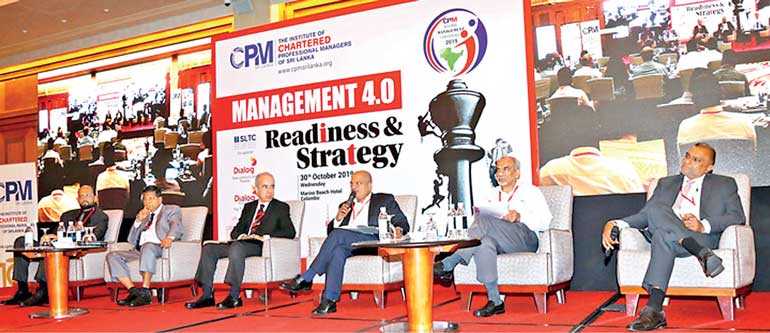
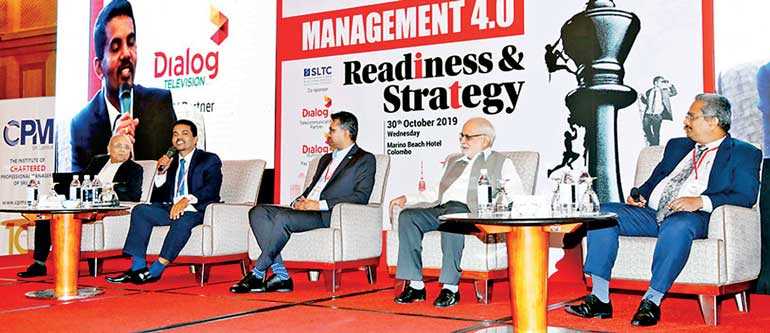
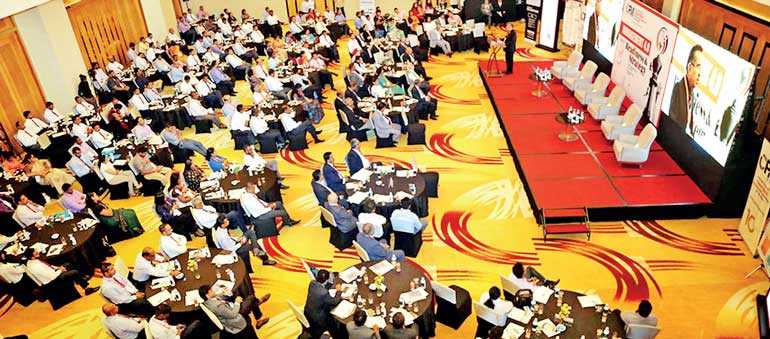
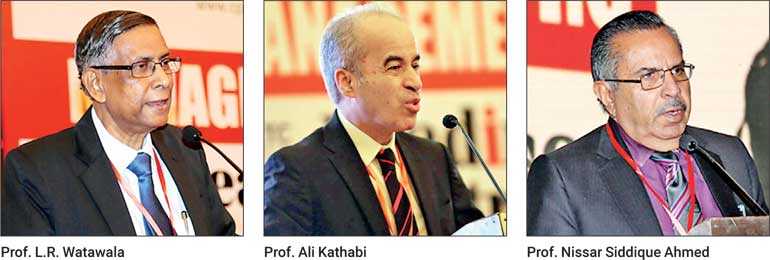
The Institute of Chartered Professional Managers of Sri Lanka (CPM Sri Lanka) concluded the CPM Regional Management Conference 2019 (CRMC 2019) in a grand style, in collaboration with the Association of Management Development Institutions in South Asia (AMDISA) at the Marino Beach Hotel, Colombo, on 30 October. The AMDISA member countries in the South Asian region and the CRMC 2019 were represented by leading management development institutions from India, Pakistan, Bangladesh, Sri Lanka, Nepal, Maldives, Bhutan and Afghanistan. The theme of the international forum was ‘Management 4.0: Readiness and Strategy’. 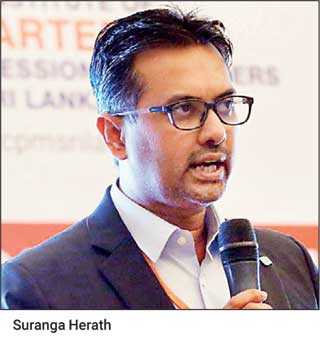
The conference was organised as a half-day deliberation, and Speaker of the Parliament of Sri Lanka and Patron of CPM Sri Lanka Karu Jayasuriya made a special speech at the forum. CPM Sri Lanka President and AMDISA past President Prof. Lakshman R. Watawala and the AMDISA incumbent President and Pakistan’s Sukkur IBA University Vice Chancellor Prof. Nisar Ahmed Siddiqui gave the opening remarks. CPM Sri Lanka Governing Council Member and University of Sri Jayewardenepura Postgraduate Institute of Management Faculty Member Dr. Samantha Rathnayake played the role of the conference’s technical designer and summed up the proceedings.
Management 4.0 strives to explore what the Fourth Industrial Revolution means to the management profession, what new competencies we need to be adapting and sharing both for existing and future leaders. This revolution are outcome the fusion of technologies such as Internet of Things, Artificial Intelligence, Big Data, Cloud Computing, 3D-Printing, Extended Reality, Autonomous Robots, Sensors, Mobile Smart Devices, etc. In this context, as management competencies and best practices are vital in improving the organisational performance and quality of work by closing the effectiveness, efficiency and productivity gaps, it is of paramount importance to seek the meaning of readiness and strategy in management 4.0.
Session I: Readiness to Respond – Organisations should be ready to adjust more rapidly and more extensively to new situations and shifting market parameters and boundaries. Management 4.0 offers multiple technology solutions and techniques. This truly becomes a “revolution” when entire value chains, whether it is in the public sector or the private sector, are ready to change. In order to remain competitively viable in the long term, it is imperative to ask the question – are the organisational structures as well as decision-making processes open to adapting to the new circumstances?
Session II: Transformational Leadership Strategy in Management 4.0 – Management 4.0 is pronounced in terms of the digital technology, rather than the employees. In fact, many employees fear this may replace their jobs. This is where transformational leadership and strategic moves can play a huge and an important role in understanding how management 4.0 is integrated into a new working life. In this backdrop, strategy is referred to as a new way of finding and making things happen for the Fourth Industrial Revolution. It’s an approach that is gaining ground as it tackles the issues surrounding people alongside the technology itself.
Two keynote speakers and veteran panellists representing key institutions both from the public and private sector in the region expressed their opinions in line with the conference theme – leaders need to exhibit and foster creativity and innovation in the workplace to succeed in today’s competitive, unstable and volatile climate. This dynamic panel discussion brought up real life experiences in their respective domains. Industry 1.0 was the first industrial revolution, with steam power and water power; Industry 2.0 the second industrial revolution, better known as the technological revolution, was the period between 1870 and 1914; Industry 3.0 occurred in the late 20th Century; and Industry 4.0 created a number of unprecedented challenges and changes to human lives.
The conference discussions were based on insights derived from Delloitt Shift Report (2015), McKensey Report (2016), McKensey Global Institute Report (2017), and World Economic Forum Reports (2016-2017 & 2018). It extensively deliberated the facts and insights derived from McKensey Global Institute Report (2017) in terms of automation and it was stressed that automation is not happening overnight, and five key factors will influence the pace and extent of its adoption:
Technical feasibility, since technology has to be invented, integrated and adapted into solutions that automate specific activities;
The cost of developing and deploying solutions, which affect the business case for adoption;
Labour market dynamics, including the supply, demand, and costs of human labour as an alternative to automation; Economic benefits, which could include higher throughput and increased quality, as well as labour cost savings;
Finally, regulatory and social acceptance can affect the rate of adoption even when deployment makes business sense.
Further, it was discussed that transportation, office administration, production, feed preparation etc. have relatively higher potential for technical automation due to their activity sets being primarily based on predictable physical activities. but in data administration where occupations such as management, personal care and sales whose activity sets mostly involve managing and developing people, applying expertise to decision making, planning, and creative tasks, interfacing with stakeholders, performing physical activities with operating machinery in unpredictable environments, have lower potential for technical automation.
CPM Sri Lanka thanks all attendees of the conference in Colombo and hopes they had an enjoyable stay here in Sri Lanka. It would also like to extend sincere appreciation for the friendly spirit of participants and request them to join in future events organised by the Institute. It is hoped that the concepts that have been put across at this conference will make the region more vibrant for all management professionals.